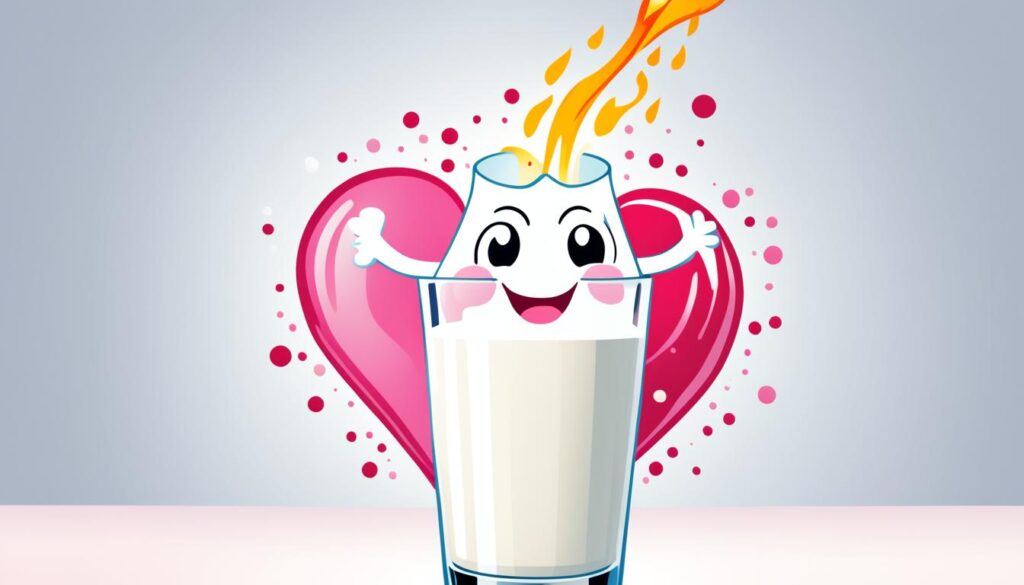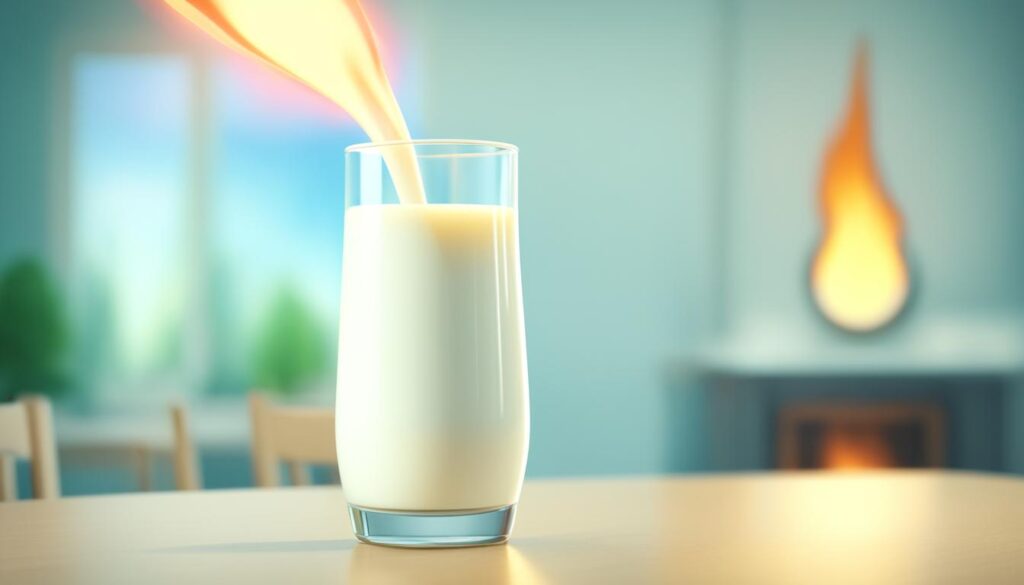Do you often get heartburn? You’re not alone. Over 60 million people in the U.S. have it monthly. Many have asked if milk eases this pain. The answer isn’t simple. While milk might help some with heartburn, it can make it worse for others.
Table of Contents
ToggleHeartburn is a common sign of GERD. It feels like a burning pain behind your breastbone. This pain can spread to your neck and throat. You can use OTC antacids for quick relief. They work fast and can help for a few hours. But changing your diet and habits might be key to stop heartburn before it starts.
Milk can sometimes soothe heartburn. The calcium and protein in it might stop stomach acid. This might prevent acid from coming back up. But milk’s fat might do the opposite. It could let stomach contents flow up more easily.
Looking for a heartburn home remedy? Try different types of milk. Low-fat or skim milk might be better. You can also test almond or goat’s milk. Remember, milk’s effect on heartburn changes from person to person. Pay attention to how your body reacts.
Understanding Heartburn
Heartburn, also called acid reflux, is a common issue. It affects about 20% of the U.S. population. This issue happens when stomach contents, like acid, flow back up the esophagus. You feel a burning in your chest. Over 60 million people in the U.S. deal with it monthly.
Symptoms include a burning behind the breastbone. It can spread to the neck and throat. Sometimes, you taste a bitter fluid coming back up.
What is Heartburn?
Heartburn is when stomach acid comes back up your esophagus. It causes a burning in your chest or throat. This occurs because the LES muscle isn’t working right. It lets stomach contents go the wrong way.
Symptoms of Heartburn
Feeling a burning discomfort behind your breastbone is the main sign of heartburn. It can also spread to your neck and throat. You might taste something bitter or sour.
Other symptoms are trouble swallowing and a throat lump feeling. Sometimes, heartburn causes a chronic cough or hoarseness. Chest pain can be confused with a heart attack.
Prevalence and Impact of Heartburn
Heartburn affects a lot of Americans every month. It can make life uncomfortable, especially by disturbing sleep. If not treated, it can lead to GERD. This can damage the esophagus and increase the risk of cancer.
Milk and Heartburn Relief
Milk helps with heartburn, but it’s not simple. Its calcium and protein can help ease this digestive issue. A lot of research shows that calcium can lower the risk of heartburn. So, drinking milk might be good for you.
Calcium in Milk as a Potential Remedy
The calcium in milk fights heartburn by lessening stomach acid. This action gives a short break from the pain and burning. So, milk may soothe your heartburn for a while.
Protein in Milk and Its Role
Milk’s protein can also aid heartburn. It boosts the release of a hormone called gastrin. Gastrin then helps the stomach empty, making you less likely to feel reflux and easing your heartburn.

Drawbacks of Drinking Milk for Heartburn
Drinking milk might help with heartburn, but it has its issues too. Whole milk and fatty foods can trigger heartburn. The high fats in milk can relax the esophageal muscles and slow digestion. This can make heartburn worse by letting stomach acid and more food move up.
Studies talk about how the fat in whole milk makes heartburn worse. It does so by relaxing the esophageal sphincter and slowing down how the stomach empties. This means your throat gets more acid and food, making heartburn worse.
Fat in milk moves slowly through your stomach than proteins and carbs. It can keep stomach contents, including acid, in your esophagus for longer. This makes heartburn last longer and feel more severe.
| Nutrient | Amount in 1 Cup (245 ml) of Whole Milk | Impact on Heartburn |
|---|---|---|
| Fat | 8 grams | Relaxes the lower esophageal sphincter and delays gastric emptying, potentially worsening heartburn |
| Protein | 7.9 grams | May help stimulate gastrin secretion and improve lower esophageal sphincter function, potentially reducing heartburn |
| Calcium | 276 mg | May have an antacid effect, potentially providing relief from heartburn symptoms |
Whether milk helps or makes heartburn worse varies person to person. While the protein and calcium in milk might soothe some, the fat could trouble others. It’s best to see how your stomach reacts to find the right approach for you.
does milk help heartburn
Some people wonder if milk helps heartburn. Information varies. Some believe milk’s calcium and protein ease heartburn. They neutralize stomach acid and help the esophagus stay strong. Yet, too much fat in whole milk might make heartburn worse. It relaxes the esophagus and slows down digestion. This means milk’s effect on heartburn can differ from one person to another. You may need to try different milks or talk to a doctor to find what’s best for you.
In 2019, a big study showed eating lots of calcium lowers men’s risk of heartburn. This hints that the calcium in milk might help with heartburn. Another study found that giving some people calcium carbonate made their esophagus muscles stronger.
Cow’s milk has a lot of fat in it. This can make heartburn worse. But almond milk is more alkaline. This might help lower stomach acid for some people.

The effect of milk on heartburn is really personal. Some find relief with milk’s calcium and protein. Meanwhile, some might see worse symptoms. To find out what works for you, try different milks. Or talk to a healthcare provider for advice.
Milk Substitutes for Heartburn Relief
Some people find dairy milk makes their heartburn worse. They can look to alternative milks for help. Almond milk is one choice. It has a higher pH level than cow’s milk. This might help reduce heartburn symptoms by neutralizing stomach acids. Goat’s milk is another option. For those allergic to cow’s milk, goat’s milk might be easier to digest. It’s also believed to have benefits for health, thanks to its anti-inflammatory properties.
Almond Milk
Almond milk’s pH level is 8.4, showing it’s alkaline. This could be good for neutralizing stomach acids. But, we need more studies to be sure it’s the best choice for acid reflux.
Goat’s Milk
If you’re looking for a milk that’s good for acid reflux, try goat’s milk. It has slightly more fat than whole cow’s milk, about 10 grams per cup. This could be due to its anti-inflammatory properties, which are good for your overall health.
Keep in mind, there’s not a lot of research on how effective these milk alternatives are for heartburn. Your reaction might be different from someone else’s. It’s good to try different options and see what works best for you.
Lifestyle and Dietary Changes for Heartburn Management
There are ways to manage heartburn without just drinking milk. Some lifestyle and diet changes can help. Keeping a healthy weight is key. Also, stay away from spicy, fatty, or acidic foods.
It’s important to eat in small amounts and not lie down right after. Exercising regularly is also very beneficial. All these steps can lower the chances of heartburn.
Weight Management
Getting rid of extra weight can lower heartburn troubles. If you’re overweight, it puts more pressure on your belly. This can make stomach contents flow back up easier.
Staying at a healthy weight reduces these issues. It helps those who have heartburn often feel better.
Avoiding Trigger Foods
To avoid heartburn, say no to certain foods. These include peppermint, caffeine, and chocolate. <em Also miss out on citrus fruits, onions, and high-fat meals. Identifying and cutting out these foods can help control heartburn.
By steering clear of known triggers, you cut your risk of getting heartburn.
Portion Control
Eating less more often and finishing dinner at least two hours before bed can stop heartburn. Big meals can stress your stomach. This can cause more heartburn.
So, watch how much you eat and when. It really helps in avoiding heartburn.
Timing of Meals
Avoid meals right before bedtime to limit heartburn. When you lie down after eating, your reflux risk goes up. Letting your body digest properly can lower heartburn chances.
Exercise
Working out helps curb heartburn triggers by managing weight. It’s good for digestion and helps lower the chance of reflux. So, exercise can really benefit you if you often get heartburn.

Antacids and Other Medications
For fast relief from heartburn, try over-the-counter heartburn medication. These come in liquid or chewable forms. They lower stomach acid fast, easing heartburn symptoms. In serious or long-lasting heartburn cases, a doctor might prescribe stronger medications. These include proton pump inhibitors or H2 blockers. They provide more lasting relief and treat the real problem.
Home Remedies for Heartburn Relief
Some people find home remedies helpful in easing heartburn symptoms. Ginger tea can lessen inflammation and calm your stomach. Watermelon or cucumber juice may also ease digestion, reducing acid reflux.
Yet, these remedies don’t work for everyone. Always talk to your doctor before treating heartburn at home. They can advise you on what’s best for your health. Some remedies may not mix well with certain medicines or health issues.
Trying ginger tea and other natural drinks is fine. But be careful, as these methods are not guaranteed to work for everyone. For the best advice, see a doctor. They can suggest the right path for managing your heartburn, be it through home treatments, changes in your daily routine, or doctor-prescribed drugs.
Consulting a Healthcare Professional
Many folks try to handle heartburn on their own. They use home fixes or meds from the store. But seeing a doctor is key, especially if your pain won’t go away or gets worse.
A healthcare pro can check you out from head to toe. They’ll find what works best to ease your trouble. Getting help early stops bigger problems later on, like hurt to your food pipe.
When to Seek Medical Advice
It’s time to talk to a doctor if your heartburn does this:
- Comes more often than twice weekly
- Makes it hard to do your daily tasks or get rest
- Causes trouble or pain when you swallow
- Makes you lose weight without trying
- Makes you feel like throwing up a lot
- Doesn’t get better with stuff you can buy without a prescription
Importance of Proper Diagnosis and Treatment
Getting medical help is a big deal. It could mean your heartburn is part of something bigger, like GERD. A doctor looks into your case to make sure you get the right fix. This stops serious issues, like bad harm to your food pipe or changes that might turn into cancer (Barrett’s esophagus).
Research and Evidence
The effect of milk on heartburn seems mixed. Studies show milk might calm stomach acid and boost a muscle that stops acid from going up. Yet, some research warns that fat in whole milk could make heartburn worse.
Conflicting Research Findings
A study in 2019 covered over 11,000 people and found eating lots of calcium might lower heartburn in men. But, a 2017 study of 217 people showed having protein at night could help ease heartburn. So, results differ based on the study.
Need for Personalized Approach
Since results on milk’s effect on heartburn can vary, a personal plan is best. How someone reacts to milk and other foods is different. So, seeing a doctor for advice tailored to you is a good idea.
Conclusion
The link between milk and heartburn can be tricky. Some may see relief from heartburn with milk’s calcium and protein. Yet, others can have their heartburn get worse because of whole milk’s high fat.
It’s good to try different kinds of milk like low-fat, skim, almond, or goat. This helps find what works for you.
Changing your lifestyle and what you eat, getting advice from a doctor, and using medications can help too. Finding the best way to manage your heartburn is about what works for you.
It’s all about what helps you personally in the end. Trying various options is key. Remember, aim for what keeps your heartburn under control.
FAQ
What is heartburn?
What are the symptoms of heartburn?
How prevalent is heartburn?
How can milk help relieve heartburn?
Are there any drawbacks to drinking milk for heartburn?
Are there any milk alternatives that may provide relief for heartburn?
What lifestyle and dietary changes can help manage heartburn?
What medications can be used to treat heartburn?
Are there any home remedies for heartburn relief?
When should I consult a healthcare professional for heartburn?
Source Links
- https://www.medicalnewstoday.com/articles/milk-for-heartburn
- https://www.healthline.com/nutrition/milk-for-heartburn
- https://www.gastroconsa.com/does-milk-help-heartburn/
- https://www.hopkinsmedicine.org/health/wellness-and-prevention/gerd-diet-foods-that-help-with-acid-reflux-heartburn
- https://www.verywellhealth.com/does-milk-help-heartburn-5214757
- https://www.webmd.com/heartburn-gerd/home-heartburn-remedies-natural-remedies-heartburn
- https://perks.optum.com/blog/does-milk-help-heartburn
- https://www.medicalnewstoday.com/articles/327233
- https://healthcareassociates.com/does-milk-help-heartburn/
- https://www.thelifeco.com/en/blog/does-milk-help-acid-reflux/
- https://www.healthline.com/health/gerd/beverages


